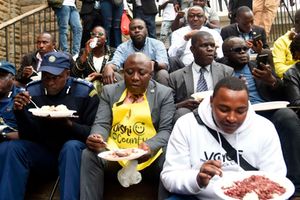
Nairobi Governor Johnson Sakaja during an interview at his office in Nairobi on April 26, 2024.
Nairobi county government will on Monday, May 12, stage a crackdown on land rate defaulters, days after kicking off the eviction of tenants who have failed to pay rent for years.
The administration of Governor Johnson Sakaja disclosed that out of the 256,000 registered landowners, only 50,000 – representing 20 per cent – have been paying land rates.
It projects to collect over Sh10 billion in outstanding rates if compliance is enforced, monies that the county government said is essential in enhancing service delivery in the capital city.
The devolved unit said there was a worrying trend by both landowners and tenants to fail in honouring their obligations, consequently denying the county government the necessary revenue to provide services like healthcare, road maintenance and others to the people of Nairobi.
Chief Officer Receiver of Revenue, Tiras Njoroge, said that the county has put in place an enforcement mechanism for the crackdown to be conducted in all the sub-counties.
“From Monday, we will begin full enforcement. That means clamping of properties, issuing of notices, and legal proceedings for chronic defaulters,” Mr Njoroge said.
The administration defended the move, stating that it had given enough window through the waiver period that ended on April 30th. It, however, accused many landowners of ignoring the notice.
“We understand the economic hardship, which is why the governor extended the waiver. But it seems for some, no window is ever enough. Now we have no choice but to act. We need these funds to provide services like garbage collection, health care, and road maintenance,” he added.
The enforcement teams, he said, will begin with high-value properties in areas such as Westlands, Upper Hill, Kilimani, and Industrial Area, before moving to residential areas across all the sub-counties.
Using its new data system, the county has mapped all the 256,000 parcels to assist enforcement officers with real time access to land rate compliance information.
The crackdown targeting landowners comes barely days after the administration started evicting tenants who have failed to pay rent running into millions of shillings in arrears.
Millions in rent arrears
Nairobi Housing Chief Officer Lydia Mathia disclosed that tenants in key estates such as Woodley, Kariokor, Uhuru, Ngara, and Harambee collectively owe the county an estimated Sh200 million. The country has since deployed officers in the counties to enforce rent collection

Residential houses in Nairobi's Woodley Estate.
Documents tabled before the Senate Roads and Housing committee last week showed that some tenants have not paid rent for 13 years despite repeated notices and eviction warnings.
With Woodley Estate being the worst affected, the document showed that some 13 tenants owe the county over Sh1 million each, with non-payment periods ranging between 65 and 158 months. Monthly rents for these tenants range from Sh11,000 to Sh17,600.
For instance, a tenant of the estate has not paid his rent for 158 months, equivalent to 13 years. The tenant, who pays a monthly rent of Sh17,600, now owes the county Sh1.8 million in unpaid rent.
In another case, a tenant who pays Sh11,000 a month, has not paid rent for 102 months, or eight and a half years, translating to arrears of Sh1.74 million.
In total, 118 tenants in the estate owe City Hall a staggering Sh39.63 million in unpaid rent.
Governor Sakaja warned of looming evictions, questioning how his administration is expected to deliver essential services when tenants refuse to honour rent obligations.
The county chief decried the widespread rent defaulting, noting that some tenants pay significantly below market rates but still fail to honour their obligations.
“If you fail to pay Sh10,000 or Sh17,000 for such a property in an area where the minimum market rent is Sh150,000, then what should we do with you?” posed the governor.









